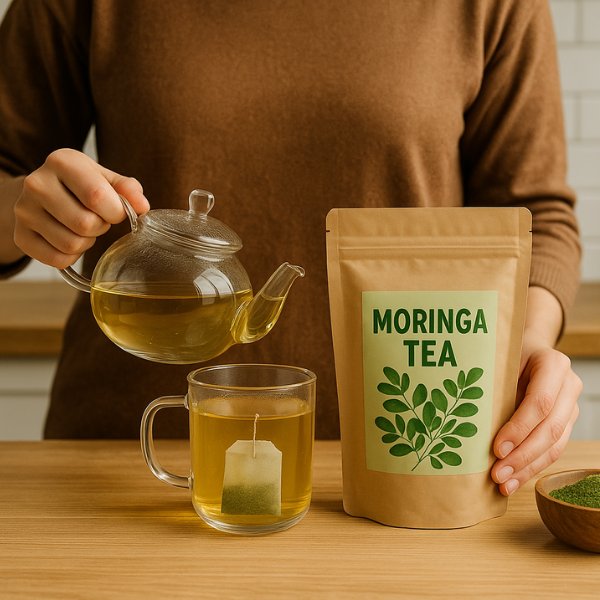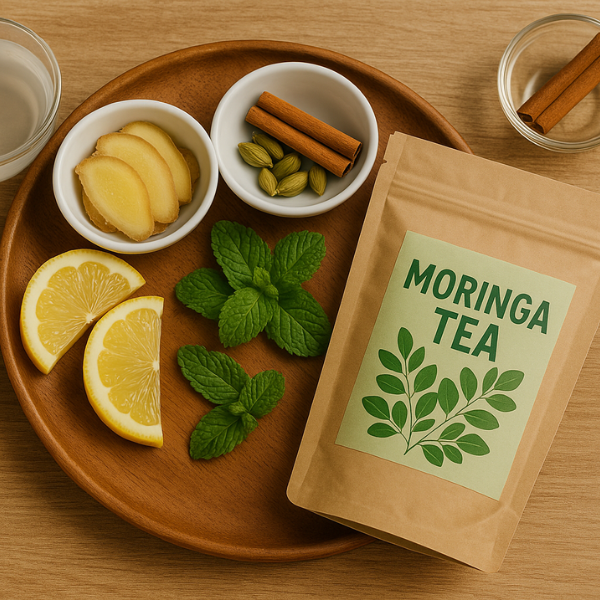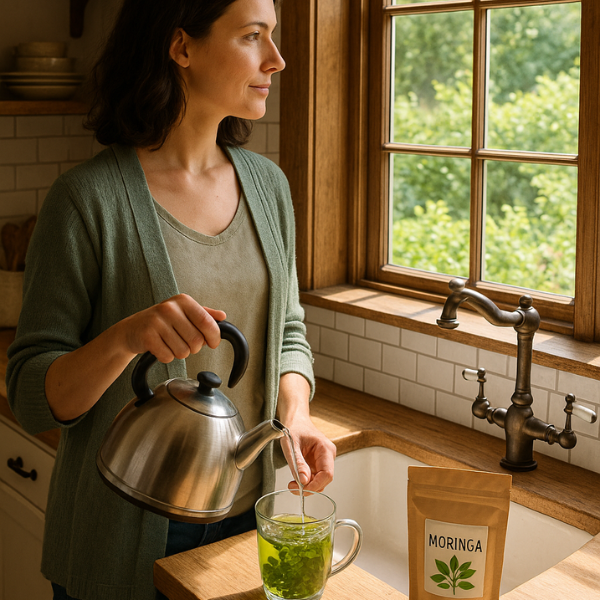The Ultimate Guide to Moringa Tea: Benefits, Nutrition, and How to Brew It

Moringa tea has been praised as one of the most nutrient-dense herbal drinks on earth — and for good reason. Known as Moringa oleifera, this vibrant green plant has been part of traditional medicinal uses for thousands of years across Africa, India, and Asia.
If you’re looking for a natural way to boost your energy, nourish your body, and support your overall wellness, moringa tea is a beautiful addition to your daily ritual. In this guide, you’ll learn what moringa tea is good for, when to drink it, who should avoid it, and how to brew the perfect cup.
🌱 What is Moringa Tea?
Moringa tea is made from the dried leaves of the Moringa oleifera tree — often called the “miracle tree” or “tree of life.”
This hardy, fast-growing tree thrives in warm climates and is native to northern India but is now cultivated worldwide for its powerful nutritional and medicinal value.
Traditionally, the entire moringa tree has been used for food and healing. The leaves, pods, seeds, and even roots have found a place in traditional medicinal uses for supporting energy, immunity, and vitality. Today, moringa leaves are dried and steeped in hot water to create a naturally caffeine-free tea that’s mild, earthy, and slightly grassy — somewhat like green tea but gentler.
💪 What Is Moringa Tea Good For?
Moringa tea is often described as a nutrient powerhouse — a cup packed with plant-based vitamins, minerals, and antioxidants. Here’s what research and traditional herbal wisdom suggest about its potential benefits:
1. Supports Healthy Blood Sugar Levels
Studies have shown that Moringa oleifera leaves may help regulate blood glucose levels by improving insulin sensitivity and reducing sugar spikes after meals.
This makes moringa tea a great choice for those watching their blood sugar or looking for natural support for metabolic balance.
2. Promotes Heart Health
Moringa tea is rich in antioxidants like quercetin and chlorogenic acid, which can help protect against oxidative stress — a key factor in heart disease.
It may also support healthy cholesterol levels and circulation, especially when combined with a balanced plant-based diet.
3. Boosts Energy Naturally
Unlike coffee, moringa tea doesn’t contain caffeine, yet it’s often reported to enhance energy and focus.
This is due to its rich blend of vitamins (especially B vitamins) and iron, which help transport oxygen to the cells and combat fatigue.
4. Supports Detox and Liver Function
Moringa oleifera has been used in traditional medicinal practices for cleansing and detoxifying the body.
Its natural compounds help the liver filter toxins more efficiently while providing antioxidant support to reduce inflammation.
5. Enhances Skin and Hair Health
Moringa tea’s high content of vitamin C, vitamin A, and amino acids helps promote collagen production, skin repair, and hair growth.
Regular consumption may help your skin glow and your hair stay strong and shiny — all from the inside out.
6. Strengthens Immunity
Rich in antioxidants, moringa tea provides support for your immune system.
Compounds like isothiocyanates and flavonoids help protect cells from free-radical damage and support a balanced inflammatory response.
7. Aids Digestion
Traditionally, moringa tea has been used to soothe the digestive tract.
It can help calm bloating, support regular bowel movements, and promote gut health — making it a great post-meal beverage.
🧠 Nutritional Facts of Moringa Tea
While exact values vary based on how the tea is prepared, Moringa oleifera leaves are among the most nutrient-dense plants on earth.
Here’s what makes it such a standout:
| Nutrient | Approximate Content (per 100g dried leaves) | Key Benefit |
|---|---|---|
| Vitamin C | 200 mg | Boosts immune system, collagen synthesis |
| Vitamin A | 16,000 IU | Supports eye and skin health |
| Calcium | 400 mg | Strengthens bones and teeth |
| Potassium | 300 mg | Maintains heart rhythm and hydration |
| Iron | 20 mg | Supports red blood cell production |
| Protein | 25% of dry weight | Provides essential amino acids |
| Magnesium | 150 mg | Relaxes muscles and supports nerve function |
| Antioxidants | High | Protects against oxidative stress |
💡 Fun fact: Moringa leaves contain more vitamin C than oranges, more calcium than milk, and more iron than spinach — making it an excellent addition to vegan and plant-based diets.
☀️ When to Drink Moringa Tea — Morning or Night?
You can enjoy moringa tea at any time of the day, but when you drink it can influence how it supports your body.
Morning: For Energy and Focus
Drinking moringa tea in the morning is ideal if you want a natural energy boost without caffeine.
It helps awaken your body gently, promote metabolism, and prepare you for the day ahead. Try sipping it instead of coffee or green tea.
Afternoon: For Digestive Support
After lunch, moringa tea can help aid digestion and reduce sluggishness.
Its mild diuretic properties can help eliminate excess water and reduce bloating.
Evening: For Relaxation and Detox
If you prefer to drink it at night, go for a light brew (1 tsp leaves in 8 oz hot water).
Moringa’s soothing properties can help you unwind, though some people report feeling slightly alert due to the iron and nutrient boost.
If you’re sensitive to energy-enhancing herbs, it’s best to drink it before 6 p.m.
🚫 Who Should Not Use Moringa Tea?
While moringa tea is considered safe for most people, there are important health warnings and precautions to keep in mind.
⚠️ Health Warning for Moringa Tea
-
Pregnant or breastfeeding women should avoid moringa tea made from roots or bark, as these parts of the plant may contain compounds that could cause uterine contractions or affect milk supply.
-
People on blood-pressure or diabetes medication should consult a healthcare professional before use. Moringa may naturally lower blood sugar and blood pressure, which can intensify the effects of medications.
-
Individuals with thyroid disorders should exercise caution, as high intake of moringa may influence thyroid hormone levels.
-
Always choose food-grade, organic moringa tea leaves. Avoid powdered supplements from unverified sources, as they may contain contaminants. The Food and Drug Administration (FDA) does not regulate moringa supplements and has not approved the use of any parts of the moringa plant in the treatment or mitigation of disease.
🩺 Disclaimer: This article is for informational purposes only and should not replace medical advice. Always consult your doctor before adding any herbal tea or supplement to your daily routine.
🍵 How to Brew Moringa Tea
Brewing moringa tea is simple — and there are several ways to do it depending on whether you’re using loose leaves, powder, or tea bags.
🌿 Ingredients:
-
1–2 teaspoons dried Moringa oleifera leaves (or 1 tea bag)
-
1 cup (8 oz) hot water (about 180°F / 82°C — not boiling)
-
Optional: 1 tsp lemon juice, ½ tsp raw honey, or a slice of ginger
🫖 Instructions:
-
Boil the Water: Heat your water until it’s hot but not boiling.
-
Steep the Leaves: Add moringa leaves to your tea infuser or teapot. Pour the hot water over the leaves.
-
Steep Time: Let it steep for 3–5 minutes for a mild flavor or up to 8 minutes for a stronger brew.
-
Strain & Serve: Strain the tea into your cup.
-
Enhance the Flavor: Add a squeeze of lemon or drizzle of honey to balance the earthy notes.
💡 Pro tip: To maximize nutrient extraction, lightly cover your cup while steeping. This helps retain heat and essential volatile compounds.
🧊 Optional: Moringa Iced Tea
For a refreshing version:
-
Brew as above, then let cool.
-
Add lemon slices and chill in the refrigerator for 2–3 hours.
-
Serve over ice with mint or cucumber.
Perfect for summer afternoons or post-workout hydration.
🌺 Moringa Tea Recipe
Homemade Moringa Tea Recipe
Ingredients
-
1–2 tsp dried Moringa oleifera leaves or powder
-
1 cup filtered water
-
Optional: fresh lemon juice, raw honey, or grated ginger
Instructions
-
Boil water and allow it to cool slightly.
-
Add moringa leaves or powder to a teapot or infuser.
-
Pour in hot water and let steep for 3–5 minutes.
-
Strain, add optional ingredients, and enjoy warm or cold.
Serving Tip:
Enjoy your moringa tea with a light vegan breakfast like oatmeal, chia pudding, or a smoothie bowl. The nutrients in moringa pair beautifully with vitamin-C-rich foods that enhance iron absorption.
🌿 Traditional Medicinal Uses of Moringa Oleifera
In ancient Ayurvedic medicine, Moringa oleifera was said to prevent or treat more than 300 ailments.
Here are a few traditional medicinal uses still recognized today:
-
Anti-inflammatory: Used to reduce swelling and joint pain.
-
Antimicrobial: Moringa leaf and seed extracts were applied to fight bacterial and fungal infections.
-
Digestive support: Brewed as a tea to soothe indigestion and aid nutrient absorption.
-
Detoxifying agent: Leaves and seeds were used to purify water and detoxify the body.
-
Reproductive health: In some traditional systems, moringa leaves were given to strengthen the body after childbirth.
While modern science is still exploring these uses, moringa’s rich nutrient and antioxidant profile supports many of these age-old benefits.
🕰️ How Often Can You Drink Moringa Tea?
Most people enjoy 1–2 cups per day safely.
Start with one cup daily and see how your body responds. Since moringa is nutrient-dense, moderation ensures your body can absorb and utilize its goodness effectively.
If you’re using powdered moringa (in smoothies or capsules) and drinking moringa tea, be sure not to exceed the recommended dosage — typically around 1 teaspoon of dried powder per day for general wellness.

🌼 Flavor and Pairing Tips
Moringa tea’s earthy, green flavor pairs well with:
-
Lemon or lime (adds brightness)
-
Ginger (adds warmth and spiciness)
-
Mint (refreshing and cooling)
-
Cinnamon or cardamom (comforting and aromatic)
-
Coconut water (for cold infusions)
Try mixing moringa with other herbal teas like lemongrass, tulsi (holy basil), or hibiscus for layered wellness blends.
💚 Final Thoughts: Why You Should Try Moringa Tea
Moringa oleifera is one of the most powerful and sustainable plants you can add to your wellness routine.
It provides a natural way to support energy, detox, heart health, and skin vitality — all while being caffeine-free and completely plant-based.
Whether you’re exploring traditional medicinal uses or simply want a nutrient-rich herbal tea, moringa offers a unique blend of science and ancient wisdom.
Brew it in the morning for energy, sip it in the afternoon for digestion, or enjoy it before bed for gentle detox and relaxation.
📜 Health Disclaimer
This content is for educational purposes only and is not intended to diagnose, treat, or cure disease.
Consult your healthcare provider before using moringa tea if you are pregnant, breastfeeding, or taking any medication for blood sugar, blood pressure, or thyroid conditions.
Always purchase from reputable brands to ensure purity and quality.
You may also enjoy these articles:
Moringa Smoothie Recipe: The Ultimate Vegan Superfood Drink for Energy and Health

